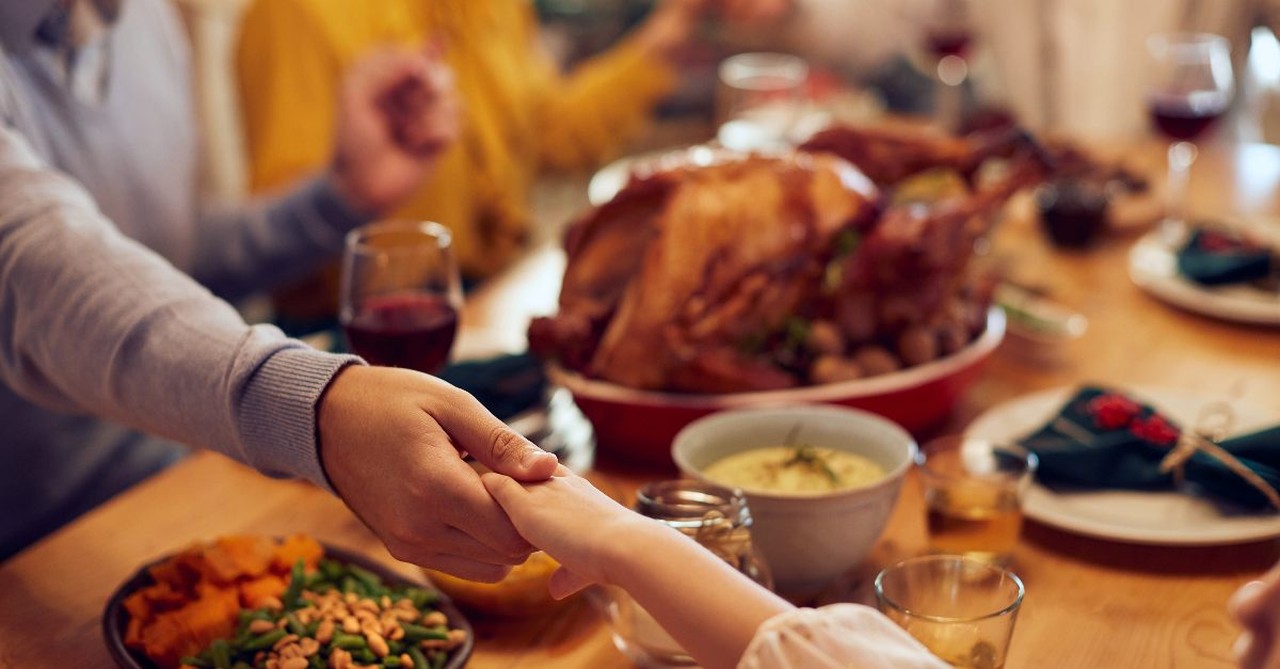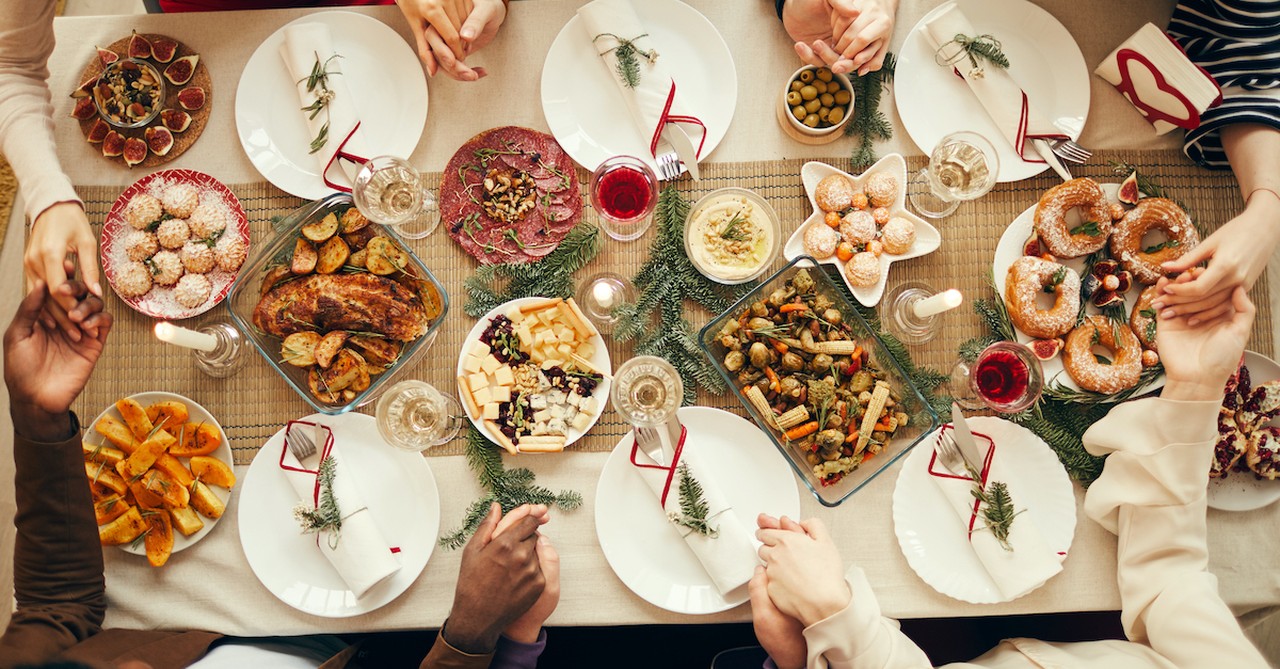5 Ways to Open Your Home and Heart This Thanksgiving

As the holiday season rolls around yet another year, it may be met with many emotions. For some, the holiday season can be a mixed bag of grief, disappointment, expectation, or even anticipation. For others, it's a season of joy. And for others, it can be a pendulum swing of feelings, both wonderful and sad, both joyous and painful. Certainly, for most, the holidays can present a full range of emotions and yet an opportunity to connect with others in profound and powerful ways.
As we acknowledge these emotions, we also have an opportunity to acknowledge God and his incredible power to save, heal, and redeem. Through our faith in Him, weeping can be turned to dancing, grieving to worship. As Thanksgiving approaches rapidly, let's ponder how God can redeem the holidays and consider how we can honor God, ourselves, and others through intentional acts of inclusion, gratitude, and worship.
1. Play to Your Strengths

1. Play to Your Strengths
SLIDE 1 OF 5
According to the grace given to us, we have different gifts: If prophecy, use it according to the proportion of one's faith; if service, use it in service; if teaching, in teaching; if exhorting, in exhortation; giving, with generosity; leading, with diligence; showing mercy, with cheerfulness. —Romans 12:6-8
Each member of the body of Christ is uniquely blessed with spiritual and physical gifts. As we approach Thanksgiving this year, we might take stock of our unique spiritual gifts and consider how we can apply them to our Thanksgiving customs. Romans 12 expresses these spiritual gifts of the Holy Spirit:
-Wisdom
-Understanding
-Counsel
-Fortitude
-Knowledge
-Piety
-Fear of the Lord
While this list is not exhaustive, and other Scriptures point to additional and more nuanced gifts, reflecting upon this list and perhaps even doing a little personal study and digging can help us all determine our individual giftings. As we reflect upon these gifts, we might consider how we can use our spiritual strengths to love the people around us.
Perhaps your gift is knowledge or understanding; can you press into that gifting and ask God for the knowledge of who needs to be invited to your Thanksgiving gathering? Can you ask God for the fortitude to love a difficult person in your life and open your home to them? Maybe you're gifted with one of the gifts not included on this list, perhaps hospitality. How might you play to the strengths already within you and create a wonderful space for people to gather?
Need help figuring out where to start? Check out this Spiritual Gift Assessment, compliments of my local church!
2. Share What You've Got

2. Share What You've Got
SLIDE 2 OF 5
Every day they devoted themselves to meeting together in the temple, and broke bread from house to house. They ate their food with joyful and sincere hearts, praising God and enjoying the favor of all the people. Every day the Lord added to their number those who were being saved. —Acts 2:46–47
The picture of the early church, as expressed by the Apostle Luke in the book of Acts, is one of beauty and unity. The idea of breaking bread with others daily has more or less been lost in Western culture. But what if we could change that? Even just a little bit?
Perhaps we can allow this holiday season to start a shift in our hearts and our homes. What if we make the concept of "thanksgiving" a weekly or monthly one? What if we began opening our homes regularly and casting the net wide, inviting members of our churches and community to break bread together?
This Thanksgiving, take some time to consider who you might invite and then be moved to action. Let's open up our homes, messy and imperfect as they might be, and dwell in the community of others, reflecting the model of the early church and bringing a little taste of Heaven down to earth.
Photo credit: ©GettyImages/SeventyFour
3. Focus on Relational Rather than Traditional

3. Focus on Relational Rather than Traditional
SLIDE 3 OF 5
To the Jews I became like a Jew, to win Jews; to those under the law, like one under the law—though I myself am not under the law—to win those under the law. To those who are without the law, like one without the law—though I am not without God's law but under the law of Christ—to win those without the law. To the weak I became weak, in order to win the weak. I have become all things to all people, so that I may by every possible means save some. —1 Corinthians 9:20-22
Each of us has grown up with our own traditions as it pertains to the holidays. Some of those traditions have been retained in adulthood and even re-imagined in ways that fit our specific culture, community, and families. Traditions are great. They are beautiful. They can be comforting, nostalgic, and soulful. On the other hand, traditions occasionally have the effect of alienating, creating barriers, and excluding.
The Apostle Paul coaches the church in Corinth on drawing others into the community. We can apply his teachings to our context, determining to meet people on their ground. Perhaps this year, things can "look a little different." The holidays don't have to be steeped in tradition. They could have a flavor of long-held traditions but still create space for new practices or even learning from the holiday customs of others.
An effortless way to do this is to allow the conversation at our holiday parties and meals to touch on each individual's background and experiences with the holidays. If you are hosting a dinner or party, consider asking your guests to bring a traditional dish—something that they often eat or share during their holiday gatherings. Hold space for the individuals around your table, and invite someone else to say the prayer, even if it is different than something you're used to. Allow these differences to be a point of good and inquisitive conversation. Let Paul's words be your guide, and relationship be the goal.
4. Expand Your Circle

4. Expand Your Circle
SLIDE 4 OF 5
Do not forget to show hospitality to strangers, for by so doing some people have shown hospitality to angels without knowing it. —Hebrews 13:2
For years, my holiday "circle" was restricted to family exclusively. After several out-of-state moves, I realized that the reality of life meant that I would end up pretty lonely if I were only to invite family to holiday celebrations. I needed to expand my circle. I remember the first time I was invited to a "friends-giving" celebration. It completely transformed my idea of a holiday gathering.
Through a "friends-giving," my circle expanded, and so did the opportunity to love people. This year I know I will be yet again challenged to open up my circle. Perhaps this means inviting neighbors or new church members to break bread, share stories and develop relationships.
I am often reminded that my home is not really my home; it belongs to God. The food I prepare belongs to God. My resources, time, talent, and treasure all belong to God. As we consider wise stewardship of what God has given us, might we also be moved to show hospitality to those around us, maybe even strangers, maybe even angels?
5. Consider the True Meaning of Gratitude

5. Consider the True Meaning of Gratitude
SLIDE 5 OF 5
I know what it is to be in need, and I know what it is to have plenty. I have learned the secret of being content in any and every situation, whether well fed or hungry, whether living in plenty or in want. —Philippians 4:12
When the Apostle Paul wrote to the church in Philippi, he could have written a letter expressing his misfortunes. He could have lamented, cried, whined even, and honestly, he would have been justified. Nevertheless, Paul shares a different perspective. He writes of gratitude, endurance, and contentment.
As we approach the holiday season, might we all become like Paul in this way? As difficulty approaches, let us rejoice. As we feel the tension of ever-rising gas and grocery prices, we have the opportunity to consider gratitude. If what we have feels like a meager offering, let it be an offering to the Lord. Let us practice wise stewardship in our little and our plenty. As we shift our perspectives, working towards a heart of genuine gratitude, perhaps this will overflow and spill out into our homes, workplaces, churches, and community.
The opportunity is ours. Will you take it?
Rachel Baker is the author of Deconstructed, a Bible study guide for anyone who feels overwhelmed or ill-equipped to study the word of God. She is a pastor’s wife and director of women’s ministries, who believes in leading through vulnerability and authenticity. She is a cheerleader, encourager, and sometimes drill-sergeant. She serves the local church alongside her husband, Kile, in Northern Nevada. They have two amazing kiddos and three dogs. Rachel is fueled by coffee, tacos, and copious amounts of cheese. For more on her and her resources to build your marriage, see her website: www.rachelcheriebaker.com or connect with her on Instagram at @hellorachelbaker.
Originally published October 27, 2022.









